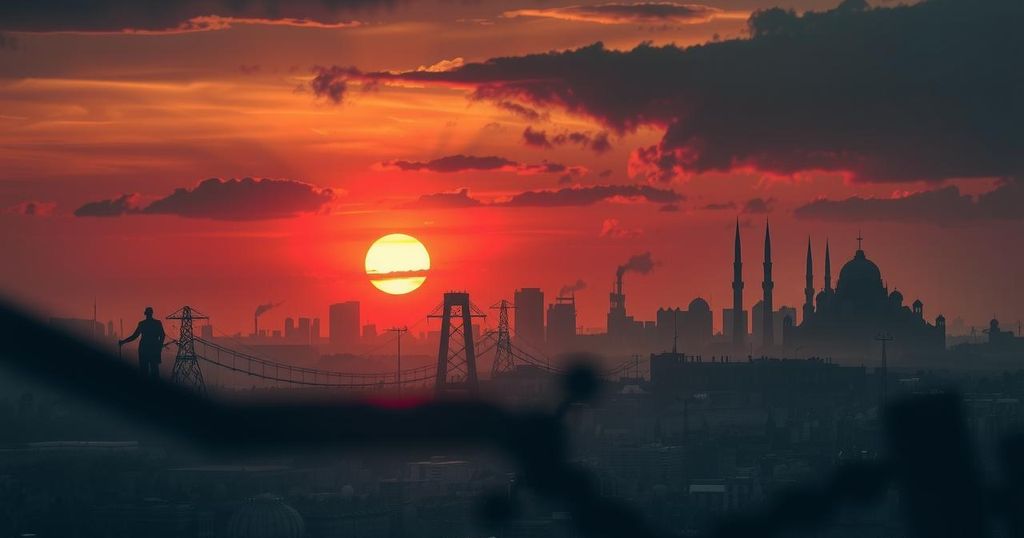M23 Rebels Capture Goma, Escalating Tensions in Eastern Congo

On January 27, 2025, M23 rebels, allegedly supported by Rwanda, declared control of Goma, inducing widespread panic among its residents. The Congolese government has reacted to the urgency of the situation, with fears of escalating violence and humanitarian crises deepening. International responses are calling for a ceasefire and accountability amid a breakdown in Congolese-Rwandan relations, amidst ongoing territorial conflicts across the region.
On January 27, 2025, the M23 rebel movement, reportedly backed by Rwanda, announced its seizure of Goma, a crucial city in eastern Congo. This takeover followed a 48-hour ultimatum issued to the Congolese military to surrender their weapons. Despite the violent entry into Goma, which prompted mass panic among its 2 million inhabitants, the rebels assured residents to remain calm. As the regional instability escalated, the Congolese government has yet to issue an official response.
The M23’s advance into Goma has heightened tensions and incited immense fear, prompting the United Nations to describe the situation as a crisis. The closure of the airport and blockage of major roads have left many residents feeling trapped. This situation exacerbates one of Africa’s longest and most devastating conflicts, pushing millions into further humanitarian distress amid ongoing violence.
On January 25, 2025, the Congolese government severed ties with Rwanda, which has faced accusations—from both Congo and U.N. experts—of supporting the M23 rebels. The violence has resulted in the deaths of at least thirteen peacekeeping soldiers in the preceding week, with many Congolese citizens once again fleeing their homes. The situation continues to deteriorate following failed peace negotiations in recent months.
The M23 rebels escalated their actions by demanding the Congolese army to surrender their firearms, warning that failure to comply would result in the city’s capture. Reports indicate a number of Congolese soldiers have begun to disarm and seek shelter under U.N. peacekeeping facilities. The Uruguayan army confirmed an influx of at-risk soldiers into their bases as part of the disarmament process.
Congo’s Foreign Minister, Thérèse Kayikwamba Wagner, characterized the situation as a blatant aggression from Rwanda and a public declaration of war. Rwanda’s U.N. ambassador, Ernest Rwamucyo, refrained from confirming these accusations and placed the blame on the Congolese government for the crisis. The international community, including the United States and France, has urged for an immediate ceasefire and a retreat of Rwandan assistance to the M23 rebels.
In essence, while Rwanda denies providing aid to the M23, it has publicly acknowledged a military presence in Congo, citing security concerns arising from Congolese troop movements. U.N. estimates suggest that approximately 4,000 Rwandan forces may currently be deployed in Congo, complicating the situation further.
The ongoing conflict in eastern Congo has deep roots, stemming from historical tensions and political instability in the region. The M23 rebel group emerged during this turmoil, often accused of receiving support from neighboring Rwanda amidst allegations of human rights abuses and resource exploitation. As one of the most protracted conflicts in Africa, the violence has led to widespread displacement and humanitarian crises, prompting multiple regional and international efforts to broker peace. The recent events surrounding Goma highlight the fragility of the situation and the complexities involved in achieving stability in the area.
The capture of Goma by M23 rebels represents a significant escalation in the ongoing conflict in eastern Congo, exacerbating an already dire humanitarian crisis. Despite international calls for a ceasefire and accountability for the violence, the situation remains starkly precarious. Relations between Congo and Rwanda have deteriorated sharply, raising fears of further escalation and affecting the security dynamics in the region. As the world watches, the consequences of these developments will likely reverberate throughout the wider region.
Original Source: www.thehindu.com








